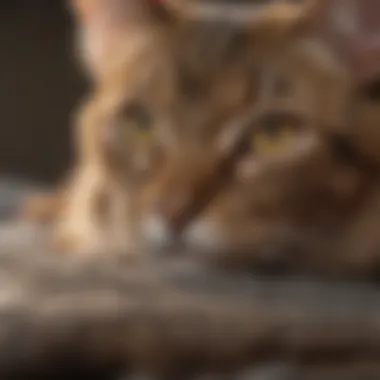Unveiling the Complexities of Colitis in Feline Companions


Pet Care Essentials
Daily Nutrition Requirements
A balanced diet is foundational in supporting your cat's digestive health and overall immune system. Introducing fiber-rich foods, probiotics, and quality protein sources can help regulate your cat's bowel movements and reduce inflammation in the colon. Ensure your cat has access to fresh water at all times to prevent dehydration, which is especially crucial for cats with colitis.
misstep
Ecxercise and Playtime Regular physical activity not only keeps your cat at a healthy weight but also aids in maintaining proper digestive function. Engage your cat in interactive play sessions to encourage movement and stimulate their natural hunting instincts.
Grooming Tips
While grooming may not directly impact colitis, maintaining your cat's hygiene can prevent secondary bacterial infections, which may exacerbate colitis symptoms. Regular brushing, nail trimming, and ear cleaning can help keep your cat comfortable and healthy.
Health and Wellness Check-ins
Scheduled veterinary visits are essential in monitoring your cat's overall health, including any digestive issues such as colitis. Your veterinarian can provide guidance on managing colitis, adjusting your cat's diet, and recommending medication or supplements if needed.
Behavior & Training
Understanding Your Pet's Body Language Cats communicate through body language, and understanding their cues can help you identify signs of stress or discomfort related to colitis. Common signs include changes in posture, grooming habits, and vocalizations. Observing your cat's body language can facilitate early intervention and management of colitis symptoms.
Basic Training Techniques
Training your cat to respond to commands can aid in managing colitis-related issues, such as administering medication or introducing new dietary habits. Positive reinforcement techniques, such as treats or affection, can help reinforce desired behaviors and reduce anxiety.
Behavioral Concerns & Solutions
Colitis can sometimes lead to changes in your cat's behavior, such as litter box aversion or increased aggression due to discomfort. Addressing these behavioral concerns with patience and consistency can help alleviate stress and improve your cat's quality of life.
Socialization Tips
Encouraging positive social interactions with your cat can help reduce stress levels and promote mental well-being. Engage in interactive play, provide enrichment activities, and create a safe and calm environment for your cat to thrive.
Pet Home Environment
Creating a Pet-friendly Space Designating a quiet and comfortable space for your cat to relax can help alleviate stress associated with colitis. Provide cozy bedding, hiding spots, and vertical spaces for your cat to feel safe and secure.
Safety Measures and Hazards to Avoid
Eliminate potential hazards in your home that may worsen colitis symptoms, such as toxic plants, small objects that can be ingested, or stressful stimuli like loud noises or unfamiliar pets. Creating a cat-friendly environment reduces the risk of triggering colitis flare-ups.
Choosing the Right Toys and Accessories
Selecting toys that stimulate your cat's senses without overstimulating them can boost mental and physical well-being. Interactive toys, puzzle feeders, and scratching posts cater to your cat's natural instincts and provide enriching stimuli.
Setting Up a Comfortable Resting Area
A cozy and peaceful resting area is essential for cats with colitis to unwind and recharge. Offer a variety of resting spots throughout your home, away from high-traffic areas, to allow your cat to retreat and rest undisturbed.


Pet Health Issues
Recognizing Signs of Illness Being attuned to your cat's behavior and habits enables early detection of possible health issues, including colitis. Symptoms such as diarrhea, constipation, blood in the stool, and decreased appetite warrant immediate attention from your veterinarian.
Preventative Care Measures
Incorporating preventive care strategies, such as regular veterinary check-ups, maintaining a healthy diet, and keeping your cat's environment clean, minimizes the risk of colitis development and other health issues. Preventative care is key to promoting your cat's long-term well-being.
Common Ailments and Treatments
Aside from colitis, cats may experience various common ailments such as urinary tract infections, dental problems, or skin issues. Understanding the symptoms, treatments, and preventive measures for these ailments equips you to handle any health challenges that may arise in your cat.
Emergency Preparedness
In the event of a health emergency, having a well-prepared emergency kit and knowing the location of the nearest veterinary clinic are vital. Immediate access to essential items like contact information, medical records, and emergency supplies ensures prompt and efficient care for your cat during unexpected situations.
Introduction
What is Colitis?
Overview of colitis in cats
Colitis in cats is a prevalent inflammatory condition that affects the large intestine, leading to a myriad of gastrointestinal issues. In this section, we delve into the specific characteristics of colitis in felines, shedding light on its impact on the digestive system and overall well-being of cats. Understanding the nuances of colitis in cats is crucial for pet owners, as it enables early detection and proactive management of this condition, ensuring the health and vitality of our feline friends.
Types of colitis in felines
Exploring the diverse types of colitis in felines unravels the nuanced differences in presentation, causes, and treatment approaches. By delineating the unique features of each type, this section facilitates a deeper understanding of the multifaceted nature of colitis in cats. Understanding the variations in types of colitis equips readers with the knowledge to differentiate between them, allowing for targeted interventions and tailored care plans for feline companions. Each type brings its own set of advantages and challenges, necessitating a comprehensive exploration to provide holistic support and management strategies in the context of this article.
Causes of Colitis
Colitis in cats is a complex condition influenced by various factors. Understanding the causes of colitis is pivotal for cat owners to grasp how to manage this inflammatory ailment in their feline companions. By delving into the triggers of colitis, individuals can implement preventive measures and effectively address their cat's health concerns. The section on Causes of Colitis serves as a cornerstone in unraveling the intricacies of this condition, shedding light on the diverse factors that contribute to its manifestation.
Dietary Factors
Impact of diet on colitis
Colitis in cats is notably affected by their dietary intake. The impact of diet on colitis is profound, with certain food choices exacerbating or alleviating the ailment. Understanding the role of diet in feline colitis allows cat owners to make informed decisions regarding their pet's nutrition. By elucidating the correlation between diet and colitis, this section equips readers with essential knowledge to tailor their cat's meals for optimal digestive health.
Kommon trigger foods
Investigating common trigger foods is essential in managing colitis in cats. Identifying these culprits enables pet owners to steer clear of potential irritants that could aggravate their cat's condition. By outlining the common trigger foods associated with colitis, this section empowers readers to curate a diet that is conducive to their feline companion's well-being.
Infections
Bacterial and parasitic causes
Understanding the bacterial and parasitic causes of colitis sheds light on the infectious component of this condition in cats. Bacteria and parasites can play a significant role in triggering and exacerbating colitis symptoms in felines. By exploring the nuances of these microbial agents, cat owners can take proactive measures to protect their pets from potentially harmful infections. This section delves into the interplay between bacterial and parasitic causes and the manifestation of colitis in cats.
Underlying Health Conditions


Links to other health issues
Colitis in cats is often intertwined with various underlying health conditions. Exploring the links between colitis and other health issues elucidates the interconnected nature of feline ailments. By highlighting these associations, cat owners can adopt a holistic approach to managing their pet's overall well-being. This section underscores the importance of addressing underlying health conditions in tandem with treating colitis to promote comprehensive care for feline companions.
Symptoms of Colitis in Cats
In the realm of feline health, understanding the symptoms of colitis is paramount for cat owners. Colitis, an inflammatory condition, manifests in various ways, making it crucial to recognize the signs early. By recognizing these symptoms, pet owners can promptly seek veterinary care, ensuring their beloved feline friends receive the necessary treatment and support. The symptoms of colitis in cats serve as red flags, signaling potential underlying health issues that require attention and management.
Physical Signs
Digestive disturbances
Digestive disturbances in cats with colitis are characterized by irregular bowel movements, vomiting, and changes in appetite. These disruptions in the digestive system often lead to discomfort and distress in felines, affecting their overall well-being. Understanding these digestive issues is essential for implementing dietary changes and monitoring a cat's response to different foods. It is crucial for pet owners to work closely with veterinarians to address these disturbances and establish a suitable management plan.
Changes in bowel movements
Changes in bowel movements, such as diarrhea or constipation, are common indicators of colitis in cats. Monitoring fecal consistency and frequency is vital in assessing a cat's gastrointestinal health. Changes in bowel movements can provide valuable insights into the severity of colitis and the effectiveness of treatment measures. Addressing these changes promptly can aid in alleviating discomfort and improving a cat's quality of life, reinforcing the significance of recognizing and addressing bowel movement irregularities.
Behavioral Changes
Lethargy and discomfort
Lethargy and discomfort are prevalent behavioral changes observed in cats with colitis. Felines experiencing colitis may show signs of lethargy, reduced activity levels, and increased restlessness due to digestive discomfort. Understanding these behavioral shifts is crucial for pet owners to differentiate normal feline behavior from potential colitis-related distress. By recognizing lethargy and discomfort as potential symptoms of colitis, cat owners can proactively seek veterinary advice and implement strategies to enhance their cat's comfort and well-being.
Diagnosis and Treatment
When it comes to comprehending the complexities of colitis in cats, the section focusing on Diagnosis and Treatment plays a pivotal role in this comprehensive guide. Understanding the nuances of diagnosing and managing colitis in felines is crucial for pet owners seeking to ensure the well-being of their beloved companions. By outlining specific elements such as diagnostic tests and physical examinations, this segment aims to shed light on the process involved in identifying and treating colitis effectively.
Veterinary Evaluation
Diagnostic Tests
Delving into the realm of diagnostic tests, this facet is instrumental in unraveling the mysteries of colitis in cats. These tests serve as valuable tools in pinpointing the underlying causes of colitis, guiding veterinarians in formulating targeted treatment plans. One key characteristic of diagnostic tests is their ability to provide insights into feline health that are not visible through physical examination alone. While these tests offer a non-invasive means of investigation, their results are imperative in guiding medical decisions for cats with colitis. Despite their efficiency, some diagnostic tests may have limitations, requiring a broader diagnostic approach for comprehensive assessment.
Physical Examination
The physical examination aspect of veterinary evaluation is another crucial component in the diagnosis and treatment of colitis in cats. Through hands-on assessment, veterinarians can detect subtle signs of colitis such as abdominal tenderness or rectal abnormalities. A key characteristic of physical examinations is their ability to offer immediate feedback on a cat's overall health status. This real-time evaluation aids in determining the urgency of treatment interventions and helps in monitoring the progression of colitis. While physical examinations provide valuable on-the-spot information, they may not always reveal underlying health issues that require more in-depth diagnostic procedures.
Management Strategies
For pet owners navigating the realm of colitis, understanding the various management strategies is vital for effectively addressing this condition in feline companions. This segment elucidates two primary approaches: medication options and dietary modifications.
Medication Options
When exploring medication options for colitis, it is essential to consider their role in managing inflammation and symptoms in cats. A key characteristic of these medications is their ability to target specific aspects of colitis, such as reducing intestinal inflammation or controlling diarrhea. By providing relief and promoting healing, these medications play a significant role in improving the quality of life for cats with colitis. While medications offer tangible benefits, they may also pose certain side effects or require careful monitoring to optimize treatment outcomes.
Dietary Modifications
Dietary modifications stand out as a fundamental aspect of managing colitis in cats, emphasizing the impact of nutrition on feline health. Key characteristics of dietary modifications include customizing food choices to meet a cat's unique nutritional needs and digestive sensitivities. By tailoring diets to alleviate gastrointestinal distress and support digestive function, these modifications serve as integral tools in colitis management. Despite their benefits, dietary changes may necessitate gradual adjustments and ongoing dietary supervision to ensure their efficacy and prevent potential nutritional deficiencies.


Preventive Measures
When delving into the realm of colitis in cats, understanding preventive measures becomes paramount. Preventive measures serve as a cornerstone in managing and combating this inflammatory condition that impacts our feline companions. Cats, known for their sensitive digestive systems, require a tailored approach towards preventive care. By focusing on proactive measures, pet owners can potentially avert the onset or progression of colitis in their beloved pets. It is essential to prioritize preventive strategies to uphold the well-being and longevity of our feline friends. Implementing preventive measures involves a holistic approach, encompassing various aspects such as nutrition, environmental stressors, and regular monitoring.
Nutritional Considerations
- Balanced diet importance
Balanced diet importance
In the intricate landscape of feline health, the significance of a balanced diet cannot be overstated. A balanced diet forms the cornerstone of preventive care for cats, including those suffering from colitis. Consistency in providing essential nutrients in appropriate proportions is vital for sustaining optimal digestive health in felines. A balanced diet comprises a meticulous selection of proteins, fats, carbohydrates, vitamins, and minerals tailored to meet a cat's unique nutritional requirements. This dietary approach not only aids in mitigating colitis symptoms but also contributes to overall feline wellness.
- Probiotics for gut health
Probiotics for gut health
Delving deeper into nutritional considerations, the incorporation of probiotics stands out as a pivotal component in promoting gut health among cats with colitis. Probiotics, known for their beneficial bacteria, play a crucial role in maintaining a healthy gut flora balance. By introducing probiotics into a cat's diet, pet owners can potentially alleviate inflammation and digestive issues associated with colitis. The unique feature of probiotics lies in their ability to restore the delicate microbial equilibrium in the gut, fostering improved digestion and nutrient absorption. Embracing probiotics as part of a cat's dietary regimen can provide a natural and effective means of managing colitis symptoms.
Stress Management
- Reducing environmental triggers
Reducing environmental triggers
Stress management emerges as a pivotal aspect of mitigating colitis flare-ups in feline companions. Cats, inherently sensitive beings, are profoundly impacted by environmental stressors that can exacerbate colitis symptoms. By reducing environmental triggers such as loud noises, abrupt changes in routine, or overcrowded spaces, pet owners can create a calmer and more nurturing environment for their cats. This proactive approach not only alleviates stress-related gastrointestinal disturbances but also promotes overall well-being in feline companions. Addressing environmental stressors effectively contributes to a holistic colitis management strategy, enhancing the quality of life for cats predisposed to this inflammatory condition.
Lifestyle Adjustments
Lifestyle adjustments play a pivotal role in managing colitis in cats. By incorporating specific elements like diet, physical activity, and environmental modifications, pet owners can significantly enhance their feline companions' well-being. Tending to a cat's lifestyle goes beyond mere routine; it encompasses a holistic approach towards fostering a healthy environment where the cat can thrive. Understanding the benefits of lifestyle adjustments can lead to better symptom management and a higher quality of life for cats suffering from colitis.
Exercise Regimen
Importance of phsyical activity
Physical activity stands as a cornerstone of promoting a cat's overall health, specifically in addressing colitis. The key characteristic of physical activity lies in its ability to boost digestive processes and promote bowel regularity, vital aspects in managing colitis symptoms. Regular exercise helps in reducing inflammation, maintaining muscle tone, and supporting optimal weight management in cats, hence proving to be an advantageous choice for alleviating colitis in felines. The unique feature of physical activity lies in its ability to enhance circulation and metabolic functions, which are crucial in combating gastrointestinal issues commonly associated with colitis, offering notable benefits to both the digestive system and overall health of cats.
Routine Veterinary Check-ups
Monitoring overall health
Regular veterinary check-ups are imperative in monitoring the overall health of cats with colitis. Through these check-ups, veterinarians can track the progress of the condition, assess the effectiveness of treatment plans, and detect any underlying issues that may exacerbate colitis symptoms. The key characteristic of monitoring overall health through routine check-ups is its proactive approach in preventing complications and ensuring early intervention in case of any health fluctuations. This proactive stance makes it a popular choice for cat owners dealing with colitis, offering peace of mind and a structured framework for managing their pet's health effectively. The unique feature of routine veterinary check-ups lies in their ability to provide personalized care and tailored interventions, which can address specific health concerns of cats with colitis, demonstrating advantages in timely disease management and holistic well-being.
Conclusion
As we draw the curtain on this comprehensive exploration of colitis in cats, it becomes evident that grasping the nuances of this inflammatory condition is paramount for feline caregivers. The significance of the conclusion lies in consolidating the plethora of information presented throughout the article, offering a roadmap towards effectively managing and understanding colitis in your beloved pets. From recognizing symptoms to implementing preventive measures, this concluding section serves as a crucial wrap-up, emphasizing the holistic approach required to ensure the well-being of our feline friends.
Summary of Key Points
Ensuring feline well-being
Delving deeper into the realm of feline well-being reveals a fundamental aspect of cat care that cannot be overstated. Ensuring feline well-being encapsulates the core essence of this article by shining a spotlight on the holistic welfare of cats afflicted with colitis. The key characteristic of prioritizing feline well-being lies in fostering a nurturing environment that fosters optimal health and comfort for our furry companions. This focus on well-being not only aids in managing colitis but also enhances the overall quality of life for cats, making it a popular and beneficial choice for this article. The unique feature of ensuring feline well-being lies in tailoring care strategies to individual cats, accentuating the advantages of personalized approaches in addressing colitis. Embracing this philosophy amplifies the advantages while mitigating the disadvantages, underscoring its pertinence in navigating the complexities of colitis in feline companions.
Collaboration with veterinarians
Incorporating collaboration with veterinarians emerges as a pivotal aspect contributing to the overarching goal of mitigating colitis in cats. The central characteristic of this collaboration lies in amalgamating expertise from both pet owners and veterinary professionals to devise comprehensive treatment plans tailored to the specific needs of each feline. This synergy between caregivers and veterinarians represents a pragmatic and effective choice for addressing colitis, leveraging both sets of knowledge for the betterment of feline health. The distinctive feature of collaboration with veterinarians rests in the synergy of medical expertise and intimate knowledge of the cat's behavior and routines, culminating in a harmonious approach to managing colitis. The advantages of this collaboration are evident in the refined treatments and attentive care provided, outweighing any potential disadvantages by fostering a cohesive support system dedicated to the well-being of cats afflicted with colitis.







